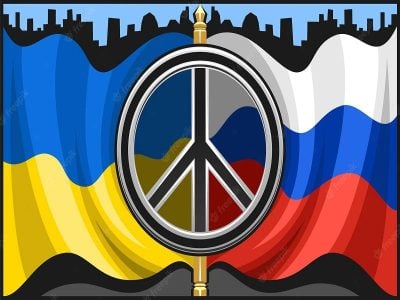Five Reasons Why Kiev Should Accept the Current Ground Realities & Negotiate Peace with Moscow

All Global Research articles can be read in 51 languages by activating the Translate Website button below the author’s name.
To receive Global Research’s Daily Newsletter (selected articles), click here.
Follow us on Instagram and Twitter and subscribe to our Telegram Channel. Feel free to repost and share widely Global Research articles.
***
These five reasons are being shared for the purpose of hopefully inspiring Kiev to pragmatically reconsider its presently recalcitrant position to peace talks with Moscow. They’re meant to be objective insofar as they acknowledge Kiev’s interests as its leadership understands them to be (despite the author disagreeing with the aforesaid of course) while still attempting to strike a fair balance between those same interests, its patrons’, and Moscow’s.
Zelensky pushed his so-called “peace plan” from last month earlier this week while talking to Indian Prime Minister Modi, which demands that Russia withdraw from the entirety of Ukraine’s pre-2014 borders as a precondition for resuming talks. This politically unrealistic stance confirms that he isn’t serious about ending the UkrainianConflict, but there are five arguments for why Kiev should reconsider its recalcitrant position:
1. The Western Military-Industrial Complex’s Limitations Prevent Kiev From Achieving Full Victory
“Biden Spilled The Beans About Why The West Can Never Fully Satisfy Zelensky’s Begging” during the Ukrainian leader’s trip to DC last week when revealing that the US can’t give Kiev weapons that it hasn’t yet shared with its NATO allies while the latter can’t deplete their stockpiles much more than they already have. Without that happening, which is impeded by the Western military-industrial complex’s limitations, it’s not possible for Kiev to achieve the full victory that Zelensky envisages.
2. Freezing The Line Of Control (LOC) Can Prevent Further Losses In The Event Of Another Offensive
Considering the extreme unlikelihood of Kiev achieving its maximum objectives in the conflict, it therefore follows that the most prudent approach is to secure the gains that it’s already made thus far around Kharkov and Kherson Regions. Failing to freeze the LOC risks the scenario of Russia either achieving a breakthrough somewhere along the existing front or perhaps opening up another one somewhere else entirely, both of which might result in further losses for Kiev.
3. Indefinitely Perpetuating The Conflict Is Mutually Disadvantageous
For as tempting as it might be for Kiev to comply with its Western patrons’ demands to indefinitely perpetuate the conflict and continue fighting “until the last Ukrainian” in order to supposedly degrade Russia’s military capabilities, this is mutually disadvantageous and should thus be avoided. While no one in the West doubts that doing so would impose growing costs on Russia, few realize how much it destabilizes their de facto New Cold War bloc’s socio-economic and ultimately political cohesion.
4. Russia’s Pragmatic Peace Signals In Recent Weeks Suggest The Sincerity Of Its Intentions
All Russian officials without exception, from President Putin on down, have signaled in recent weeks that they’re willing to politically resolve the conflict so long as their country’s reunification with Novorossiya is at the very least tacitly recognized. This suggests that Moscow is indeed sincere, which in turn draws attention both to the many constructive critiques that can be made about its special operation thus far as well as its awareness of the Golden Billion’s own struggles in this proxy war too.
5. Kiev Can Still Remain Committed To Its Maximum Objectives Without Militarily Pursuing Them
And finally, sincerely negotiating at least an indefinite ceasefire with Russia in order to relieve pressure upon itself and its especially its patrons doesn’t by any means suggest that Kiev can’t remain committed to its maximum objectives. Just like India and Pakistan continue putting forth their respective maximum demands vis-à-vis the decades-long frozen Kashmir Conflict without militarily pursuing them, so too can Kiev do the same, with this outcome perhaps even serving to solidify its national unity for years to come.
*
The abovementioned five reasons were shared for the purpose of hopefully inspiring Kiev to pragmatically reconsider its presently recalcitrant position to peace talks with Moscow. They’re meant to be objective insofar as they acknowledge Kiev’s interests as its leadership understands them to be (despite the author disagreeing with the aforesaid of course) while still attempting to strike a fair balance between those same interests, its patrons’, and Moscow’s.
*
Note to readers: Please click the share buttons above or below. Follow us on Instagram and Twitter and subscribe to our Telegram Channel. Feel free to repost and share widely Global Research articles.
This article was originally published on the author’s blog site, Andrew Korybko’s Newsletter.

